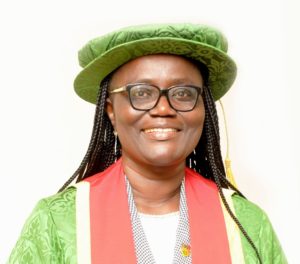Prof Rita Dickson underscores Africa’s potential to reshape global supply chain

Professor Rita Akosua Dickson, Vice Chancellor, Kwame Nkrumah University of Science and Technology (KNUST) has underscored Africa’s potential to reshape the global supply-chain.
The global supply-chain management is the distribution of goods and services throughout a trans-national companies’ global network to maximise profit and minimise waste.
The Vice Chancellor said with its strategic geographical location and young and dynamic population, Africa had the potential to reshape the global supply-chain landscape and redefine the future of work.
“Harnessing the power of innovation, technology, and sustainable practices, Africa can unlock its full potential and emerge as a hub of economic growth and social development.” Prof Dickson stated in a speech read on her behalf by Prof Charles Marfo, Provost, College of Humanities and Social Sciences, KNUST, at the opening of 2023 Supply-Chain Research Summit in Accra.
“Africa, a continent brimming with rich resources, vibrant cultures, and untapped possibilities, holds immense promise for the global economy.” The Vice Chancellor stated.
The three-day meeting, on the theme “Africa’s Supply-Chains and the Future of Work”, is being organised by the Centre for Applird Research and Innovation in Supply Chain-Africa (CARISCA), a Centre of Excellence established at the KNUST in partnership with the Arizona State University and sponsored by the United States Agency for International Development (USAID) to improve supply chains throughout Africa.
CARISCA’s key objective is to support higher education institutions in building the capacity to provide best-in-class degree programmes and training.
Prof Dickson said the annual research summit served as a global platform to explore the fascinating interplay between Africa’s supply-chains and the future of work.
She noted that the over 1,000 registrations for this year’s summit and the presence of participants from 55 countries truly highlight the significance and relevance of our discussions.
“It is a testament to the growing recognition of Africa’s potential as a key player in the global supply-chain network and the future of work.” Prof Dickson said.
She said the expected outcome of this intervention was the ultimate removal of barriers to development caused by inefficient and ineffective supply-chains, especially in health and agriculture, to drive Ghanaian and pan-African self-reliance and increase the impact of USAID investments.
Prof Dickson said the achievement of this outcome hinged on the successful interaction between the various stakeholders, including the Government through the Ministries of Health and Agriculture, private sector partners, civil society organizations, and the global academic fraternity.
She said, the sustainability of the outcomes was strongly linked to their ability to ensure that CARISCA continuously served as a resource for supply-chain researchers in Ghana and across Africa to drive the desired innovative research, translation, and training.
She said it was also significant that the efforts would ensure greater impact for women in supply chain education, research, and practice.
Dr Daniel McKorley, Founder/Executive Chairman, McDan Group, in a keynote address delivered on his behalf by Mr Richard Asante-Amoah, Chief Executive, StratGroup, underscored the need for the acceleration of Africa’s integration both horizontally and vertically through the implementation of the African Continental Free Trade Area (AfCFTA).
Speaking on the topic “Challenges and Key Success Factors in Ghana’s Logistics Sector”, Dr McKorley also called for the harnessing of Ghana’s resources to meet the needs of the people, and then export of the excess for value.
Prof Nathaniel Boso, Director, CARISCA/Dean of the KNUST Business School, said the theme for this year’s event was carefully chosen because the world of supply-chain was changing.
“COVID has taught us that the way Africa supply-chain operates in the past cannot continue to be like that and so, so many things are happening in the supply-chain, things are being integrated, things are moving so fast and the important thing that African governments need to notice is that it is changing the way the work places are designed,” he said.
Touching on the numerous roadblocks on major highways linking African countries, Prof Boso called for the demilitarization of African boarders as part of efforts to facilitate free movement of goods and persons to accelerate the continent’s socio-economic development.
Prof Professor Dale Rogers of the Supply Chain Management Department at Arizona State University and Principal Investigator for CARISCA, said Ghana’s strategic geographic location and youthful population made the nation a land of opportunities.
Source: GNA
